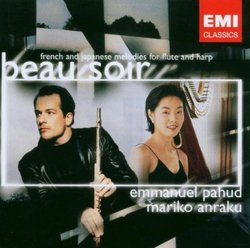Charming Intermezzo
Charles Richards | Los Angeles, CA | 03/28/2004
(4 out of 5 stars)
"After two heavy-duty releases (the charming recital of Telemann concerti released in 2002, and the fiendishly difficult transcription of the Khatchaturian violin concerto released last year)flutist Emmanuel Pahud takes a little break here with some lovely miniatures arranged for flute and harp. True, the flute and harp repertoire can seem like so much sweet candy, but when in the hands of a masterful artist like Pahud it can be as meaty, and as nourishing, as anything by Bach or Beethoven.
And Pahud is a masterful artist, no mistake about it. The Faure Sicilienne, which can be treacly if overdone, is, on this recital, as poignant and moving to the listener as if he were hearing it for the first time. The Debussy pieces, as well, have the ability to open even the hardest heart, and the oft-heard Meditation from Thais also seems remarkably fresh here.
Of course, Pahud throws in a wild card, which, in this case, is the Takemitsu. But it is not the least bit jarring, it seems to fit in the program perfectly.
The recital ends grandly with the gorgeous "Haro No Umi", which casts its spell, transporting the listener to a dreamy Japanese garden. The only other recording of this of which I know is James Galway's, which was featured on his recording entitled "The Man with the Golden Flute", but, in my opinion, Pahud's is by far superior, raising the piece from kitsch (the spirit with which Galway injects it) to true art.
Pahud is accompanied by Mariku Anraku, who provides excellent support and is a fine harpist in her own right. The pairing seems perfect, and I hope we hear more from her.
All-in-all this is a wonderful getaway album, lovely for daydreaming on a sunny day, or for late night listening. A brief intermezzo between more "serious" projects perhaps, but a welcome one."
Collaboration and contrast
Alexander T. Gafford | Midland, Ga United States | 12/21/2006
(4 out of 5 stars)
"I bought this after buying anonther album by Pahud entitled Paris. I loved his playing which seemed flawless but the selection of music seemed to me to be of the parts of the French repetoire that have a little too much creative confusion and chaos, at least for my present frame of mind. But after on line listening to online bits and pieces from Beau Soir, I took the plunge and I am glad I did.
The pairing with harp accompaniment was an inspired choice in the hands of Mariko Anraku who mangages to avoid the too sweet sound so easily found from the harp. The range of French pieces goes from the almost too well know such as Satie's Gymnopedie No 1 (remember Blood, Sweat, and Tears)to pieces by Nobolot, Monti, and Faure I had never heard but am pleased to have now. The Japanese pieces, especially the Takemitsu, are in a musical langauge that seems very alien to me with little apparent rythmn, notes coming in sequence only becuase the last one was finished. "But we know what we like becuase we like what we know." Perhaps I will grow into those in time.
Regardless, Emmanuel Pahud's playing seems sure and certain and his coordination with his accompanist perfectly done. Perhaps with a fully appreciated selection this would have been five stars. Any way, I certainly give it a full recommendation."

